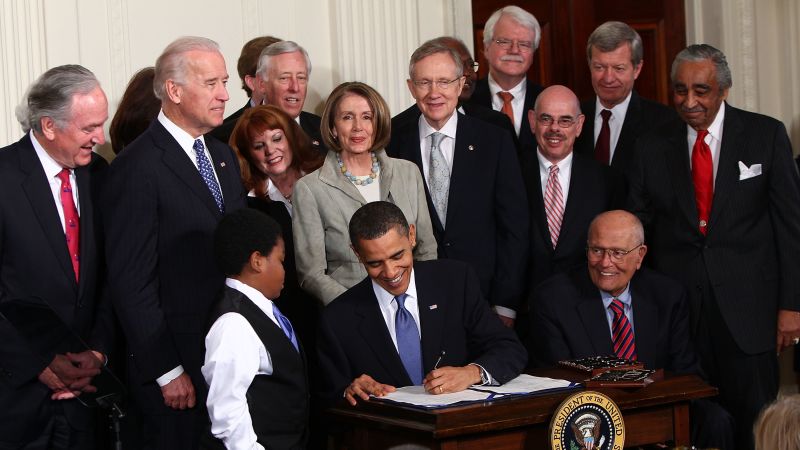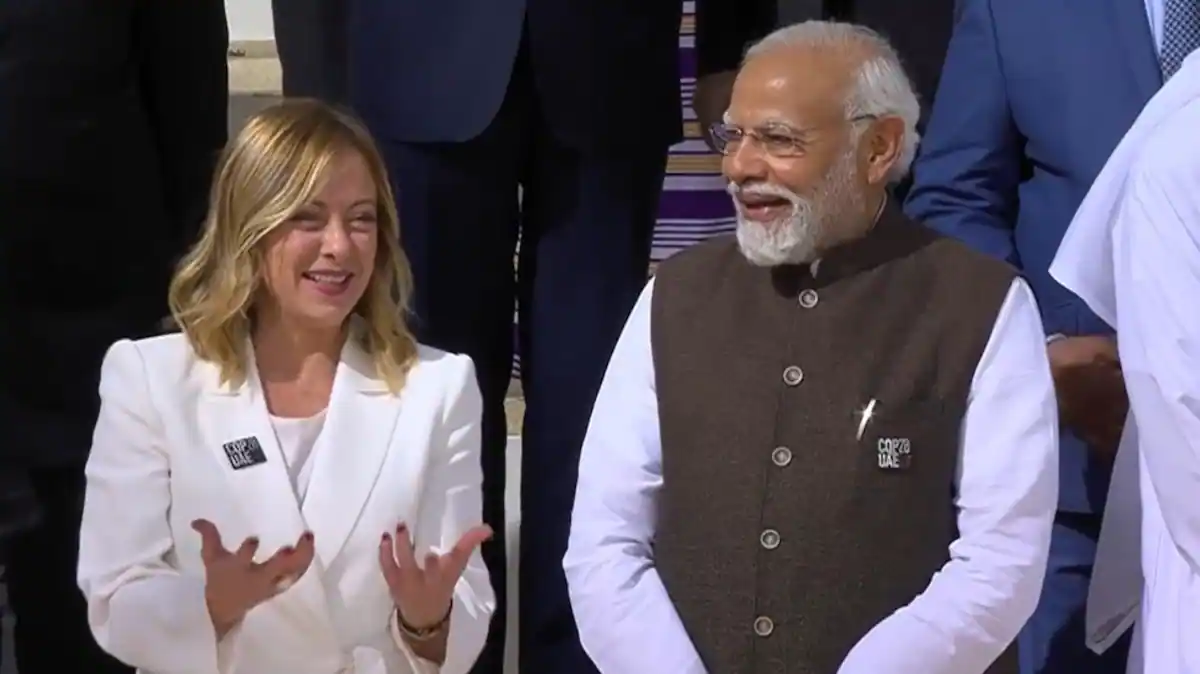
One test of a nation-changing law is that it remains a centerpiece of American life and Washington’s pitched political fights long after the president responsible left office.
Franklin Roosevelt’s New Deal still supports millions of citizens every day 90 years after he signed the Social Security Act.
Lyndon Johnson’s Voting Rights Act is still hanging on, just, despite Supreme Court decisions that watered down its protections for minority voters. The law remains a lightning rod in political disputes six decades after its passage.
In the 15 years since Barack Obama signed the Affordable Care Act into law, Republicans have tried to repeal it, to invalidate it, defund it and get it thrown out by the Supreme Court. But the law has proven remarkably un-killable and has only grown in popularity as it’s become more deeply embedded in US life. But if Republicans succeed in ending some ACA subsidies, they could begin to throttle the law to death.
Now, Obamacare is again at the fulcrum of a bitter Washington battle, as Democrats seek to leverage the government shutdown to secure the extension of healthcare subsidies to prevent premiums under the plan from soaring.
They hope to extend subsidies originally enacted by the Biden administration during Covid-19 rescue legislation and then later extended again and which expire at the end of the year. Failure to do so could spike premiums by 75% on average, according to KFF, a nonpartisan health policy research group. Obamacare is one of the best or only ways that Americans who don’t get private health insurance through employers or who are self-employed can secure plans.
The subsidies helped make the scheme more popular than ever. Last year it had roughly 24 million policyholders.
A huge hike in premiums, that will become evident in coming weeks as Obamacare customers seek re-enrollment, could make health care unaffordable and cause extreme hardship to many Americans, as CNN’s Tami Luhby has extensively reported.
Their plight is providing Democrats an opening to make a wider point. They are connecting the shutdown triggered by Obamacare subsidies to their wider narrative that Trump — especially in his Big Beautiful Bill domestic policy law, which cut federal funding for Medicaid — ripped health care away from needy citizens to finance tax cuts for his billionaire cronies.
“I cannot sit back and allow a situation where tens of thousands of people in this country will actually die, in order for Trump and the Republicans to give a trillion dollars in tax breaks to the top 1 percent,” Vermont independent Sen. Bernie Sanders, who caucuses with Democrats, told CNN’s Kaitlan Collins this week. “That is insane. It’s unacceptable. We cannot allow that to happen.”
This argument will be at the center of the midterm elections next year, when Democrats hope to win back the House of Representatives and produce the kind of brake on Trump’s relentless presidency that even an unlikely victory in the shutdown drama would be unlikely to provide.
The start of enrollment for Obamacare, in November in some states, is one reason why some Democrats believe that the political terrain around the shutdown could tip more in their favor the longer it drags on.
Republicans try to make shutdown an argument about immigration rather than healthcare
Since the shutdown took hold late Tuesday night, Republicans have signaled that they do not want to wage the political tussle on the Democrats’ preferred ground. The White House and House Speaker Mike Johnson have repeatedly argued that Democrats want to extend the health benefits so that they can award them to undocumented migrants. In this way, they are trying to refract the dispute through Trump’s most potent political cudgel — immigration.
“They have made a decision that they would rather give taxpayer-funded benefits to illegal aliens than to keep the doors open for the American people, to give vital services, veterans’ services, healthcare and nutrition for women, infants and children,” Johnson said on Thursday. “They’d rather not pay the troops and TSA agents and Border Patrol agents.”
Like the Democratic arguments on health care, Johnson’s remarks don’t tell the full story but are emotive and offer Republican partisans and conservative media a way to reach their most committed base voters.
But, undocumented immigrants have never been eligible for Obamacare subsidies, and the Republicans’ One Big Beautiful Bill Act narrowed the eligibility of certain legal immigrants. Democrats do want to roll back some provisions of that signature Trump law, but in relation to trimmed benefits for legal migrants.
Republicans are reacting with the same argument that’s failed them before on Obamacare, insisting the law simply doesn’t work. House GOP Majority Leader Steve Scalise said Thursday that Democrats themselves had caused the premium hikes by passing it. “Obamacare is the healthcare law of the land, and it’s leading to higher premiums for families,” the Louisiana Republican said.
But Democrats appear confident that Obamacare will work its political magic for them again. There is some polling evidence to support their case.
A Washington Post survey published Wednesday showed that voters blame Trump and the GOP for the shutdown to the tune of 17 points. It also indicated that most Americans agree with the Democratic stand on ACA subsidies. And 71% of Americans say that the federal health insurance subsidies should be extended, while 29% said they should end for 2026 as scheduled. While 80% of independents want the subsidies continued, only 38% of Republicans do.
The Obamacare fight could prove treacherous to the House Speaker
Republicans might be on safer political ground had they offered a more viable alternative to the Affordable Care Act. Trump, across his two terms, has often fulminated against late Republican Sen. John McCain’s famous thumbs down that meant the GOP Senate failed to repeal Obamacare in 2017. Despite making characteristic promises to give Americans the best health care they’ve ever had, he’s never followed through.
But Republicans can read polls, and the unpopularity of possibly leaving millions of Americans without health benefits — including many in red states where Obamacare still lives on despite efforts by GOP governors to curtail it — has led some party leaders to offer talks on health care with Democrats.
Johnson, GOP Senate Majority Leader John Thune and Vice President JD Vance have all taken this line. Democratic Senate Minority Leader Chuck Schumer said after a meeting at the White House on Monday that the president was open to extending Obamacare subsidies after the end of this year. “It seemed from his body language and some of the things he said that he was not aware of the ramifications,” Schumer told reporters.
But Republicans warn such conversations can only happen when the government is reopened. That would require Democrats to give up their only leverage.
Still, there’s a glimmer of a potential compromise when the initial posturing over the shutdown fades.
“There is agreement that we should be willing to negotiate an extension of the Affordable Care Act subsidies and a reform to them,” Delaware Democratic Sen. Chris Coons said on CNN News Central on Wednesday. “Republicans want to reform them. Democrats want to extend them. And they’re insisting, as of now, that we all vote to reopen the government, and then we’ll start negotiating. Coons added: “I’m encouraging them to be serious and concrete about who will negotiate, how, over what, and with what deadline.”
There are several complications, however. Democrats burned by Trump’s constitutionally questionable repeal of billions of dollars in spending already authorized by Congress are unlikely to take the president at his word that he’ll permit genuine talks.
And while a bipartisan majority might back such an off-ramp, there’s no guarantee the most hardline Republicans would get on board even if Trump did. Voting to extend subsidies first enacted under Biden’s Covid legislation would be a tough sell. And many conservatives who’ve spent years trying to eliminate Obamacare would hate to vote to save it.
If Johnson relied on Democratic votes, he’d risk returning to a familiar place — with his speakership on the line in his own tiny majority.



